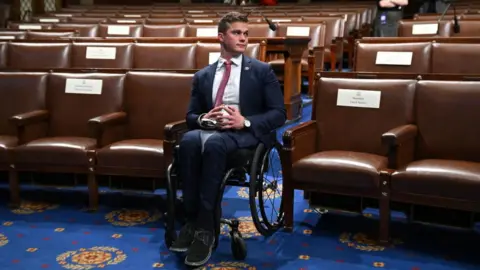Madison Cawthorn: Republicans oust Trump-backed young congressman
 Getty Images
Getty ImagesTo his fans, he was a fresh-faced outsider elected to Congress to give voice to Americans young and old fed up with 'wokeism'.
To his critics - and there were many - he was a shameless opportunist more interested in personal branding than public service.
Neither friend nor foe could dispute that he attracted plenty of attention, however, and had a firm claim to be the face of an under-tapped constituency: the young conservative.
Madison Cawthorn's hold on that reputation dissipated on Tuesday night after he lost his bid to renew his title as America's youngest congressman.
The 26-year-old was defeated in a party primary contest in his safely Republican rural North Carolina district by a slim margin, about 1,500 votes.
Seven challengers had vied for his seat, and the nomination was won by Chuck Edwards, a state senator who had earned the backing of North Carolina's seasoned senator and the more establishment elements of the party.
Plenty of problems plagued Mr Cawthorn's campaign.
In the months leading up to Tuesday's primary, he was charged twice with carrying a weapon to an airport, drew the ire of party grandees for claiming he had been invited to orgies by Republican colleagues, and faced questions over photos that featured him dressed in women's lingerie.
Voters and party bigwigs were unamused. When he ran for office, Mr Cawthorn "said some really exciting things, ran a grassroots campaign all over the district, and he showed concern [for his constituents]," said Hunter Clark, 18, a former staffer for the congressman. "For me, and for a lot of people, he was change."
His youthfulness was also part of the appeal, said Mr Clark - but his scandals have shown "he's not mature" - and he voted against his old boss this election.
Even Mr Cawthorn's most powerful backer, Donald Trump, was said to be wary of the acolyte who had ridden the former president's "Make America Great Again" coattails to office - though a day before the primary he mused that the congressman had "made some foolish mistakes, which I don't believe he'll make again" and deserved a second chance.
But Mr Cawthorn's political career has never been short of controversy.
He raised eyebrows in 2020 with social media posts bragging about visiting Hitler's holiday home. (He called the Nazi leader "a supreme evil", but angered Jewish leaders by referring to him as "the Fuhrer".)
He praised rioters who descended upon the US Capitol to overturn Joe Biden's election and apparently lied about having been admitted to the US Naval Academy.
None of that stopped the politician - who uses a wheelchair after a 2014 car crash left him partially paralysed - collecting legions of Instagram fans, and winning adulation from Gen Z followers of Trumpism.
"He is the only conservative option with the backbone to stand up to Washington liberals," said Cawthorn voter Cole, 21, who asked that his surname not be included.
But his purported influence with younger voters - the premise of Mr Cawthorn's pitch to Republicans - did not help him on primary night.
Ironically, younger voters were never the ones who hoisted him into office in the first place, said Chris Cooper, a political scientist at Western Carolina University.
 Getty Images
Getty ImagesRather, it was the promise that he could speak for them that swayed older voters, said Prof Cooper, who studies North Carolina politics.
Ahead of Tuesday's contest there was no sign of a groundswell of young people going to the ballot box, he added.
Mr Cawthorn was not wrong, though, to hone in on Gen Z's untapped potential.
In 2020, more than a third of those aged 18-29 who cast ballots voted for Mr Trump, according to analysis from Tufts University - close to 10 million votes.
But youth voting has long been a problem in modern US elections.
From 1972-1996, voter participation among 18-24 year olds dropped from 50% to 32% in presidential elections, according to census data. It has fallen further since, and is worse in the midterms.
